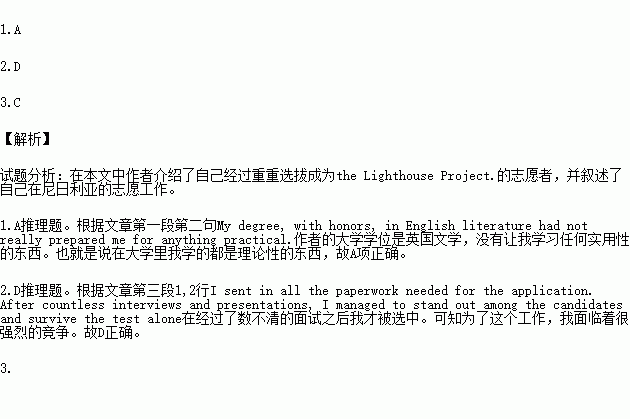题目内容
Like many new graduates, I left university full of hope for the future but with no real idea of what I wanted to do. My degree, with honors, in English literature had not really prepared me for anything practical. I knew I wanted to make a difference in the world somehow, but I had no idea how to do that. That’s when I learned about the Lighthouse Project.
I started my journey as a Lighthouse Project volunteer by reading as much as I could about the experiences of previous volunteers. I knew it would be a lot of hard work, and that I would be away from my family and friends for a very long time. In short, I did not take my decision to apply for the Lighthouse Project lightly. Neither did my family.
Eventually, however, I won the support of my family, and I sent in all the paperwork needed for the application. After countless interviews and presentations, I managed to stand out among the candidates and survive the test alone. Several months later, I finally received a call asking me to report for the duty. I would be going to a small village near Abuja, Nigeria. Where? What? Nigeria? I had no idea. But I was about to find out.
After completing my training, I was sent to the village that was small and desperately in need of proper accommodation. Though the local villagers were poor, they offered their homes, hearts, and food as if I were their own family. I was asked to lead a small team of local people in building a new schoolhouse. For the next year or so, I taught in that same schoolhouse. But I sometimes think I learned more from my students than they did from me.
Sometime during that period, I realized that all those things that had seemed so strange or unusual to me no longer did, though I did not get anywhere with the local language, and I returned to the United States a different man. The Lighthouse Project had changed my life forever.
1.According to the Paragraph 2, it is most likely that the author
A. discussed his decision with his family.
B. asked previous volunteers about voluntary work
C. attended special training to perform difficult tasks
D. felt sad about having to leave his family and friends
2.In his application for the volunteer job, the author
A. participated in many discussions
B. went through some interviews and presentations
C. wrote quite a few papers on voluntary work
D. faced strong competition from other candidates
3.On arrival at the village, the author was
A. asked to lead a farming team
B. sent to teach in a schoolhouse
C. received warmly by local villagers
D. arranged to live in a separate house.

